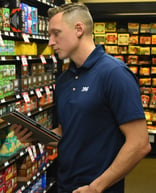First, lets start off with a round of applause for you wanting to educate yourself on food brokers! In a nutshell, food brokers are not as complicated as it sounds. A food broker is someone or a business that you outsource for retail consulting, sales and account management. Here is what a good food broker should do for you...drumroll please
1. Listen to your overall business and retail goals
Like in any professional engagement, it's not a good sign if the other party isn't asking questions to better understand your challenges and goals. Remember no two consumer based good businesses are the same.2. Tell you if they are a good or bad fit for your brand
Certain brokers may not work the geography where you want to grow market share. Ex: If you have your eye on getting your product into east coast grocer Wegmans, working with a broker based out of California who mainly works with west coast retailers may not be ideal. A good broker will let you know if they can truly help you or not before you sign any agreements/contracts.
3. Complete a type of market research for you (and them)
A good broker will want to know your estimated unit/sales volume along with other information including competitors, consumer target market and other trending data. This information will be key in putting together a go-to-market strategy.
4. Consult you on a go-to-market retail strategy
A wise food broker will make certain recommendations based on their experience and the completed market research of your brand. They will also collaborate with your team to put together a game plan. Collaboration is key!
5. Advise on which retailers to target
People are creatures of habit and while it may make sense to start targeting retailers where the broker already has a buyer relationship, it may not be the right store to target off the bat. As mentioned above, no two cpg businesses are the same.
6. Inform you on which distribution channels to use
Choosing the correct distribution for your business could be the key in whether your business fails or succeeds. Think about spending months of your time with brokers meetings, broker meetings and retail administration work. Your product finally gets accepted into the store, only to find out your product is sitting in the back of the store covered in dust or perhaps you got lucky and your product was stocked on the lowest level shelf in a corner covered by a trash can. Distribution is important and we understand that.
7. Only include retailers, not geography in customer agreement!
Imagine you choose a food broker out of Indiana who's contract states they get to be the exclusive reseller of your products to all retail grocery stores in Indiana, Michigan for your products. Years go by and they have success with selling you into all retailers but one giant retailer in Michigan. One day another broker approaches you who has a special relationship with that giant retailer in Michigan. They have a better chance of selling your product into that retailer. What do you do? You signed a contract. The take home story is that other brokers will have better relationships with certain retailers so contract with brokers on a by-store basis.
8. Connect your brand with retail buyers
Buyers have an overwhelming amount of cpg brands wanting to sell their product in their stores. A good broker will not only have a network of buyers but also know what the buyer is looking for in terms of data, product, promotion programs and more.
9. Assist with product launch at retailer
Not all brokers will assist with product launch at a retailer. Look for brokers who are excited to go audit your product at store level to ensure proper product and secondary display placement (even if you are working with a trusted distribution partner).
10. Take care of retail administration forms
Let the broker handle all retail admin forms from new item forms to purchase orders, rebates and more.
11. Complete partial store merchandising and audits
As we stated in number 9, it's not only important to check in with retailers at store level upon launch, but it's just as important to check in monthly/quarterly. The more stores visits, the better relationship with the store managers, which likely means better product placement over time.
12. Meet to review and strategize about future opportunities
A good broker-cpg business relationship should be built on good communication and spending time trying to improve product exposure and increase sales.
 Congrats, you now know more
Congrats, you now know more
about food brokers than you did a
couple of minutes ago!
Let us know what you think of this blog in the comment section below.
At Johnny B Goods we understand it can overwhelming trying to get into new retail accounts and establish your brand to increase sales. We also know it be expensive to hire a Regional Retail Sales Manager and a Retail Account Manager for your brands at retail. Enter...Johnny B Goods. We are contracted Consultants, Sales and Account Managers for your brand(s) at retail who take pride in saving you time and money. Let us manage everything from the initial buyer sell-in process to account management for you today!
Author Bio: Luke | Co-Founder at Johnny B Goods
As a son of a father who has always worked in the retail cpg industry, Luke can still recall the nostalgic feelings of being able to go into the back of grocery stores with his Dad to look for inventory, stock the shelfs and also hear customers in the aisle rave about the company's products Luke's Dad worked for. To this day, Luke has the same passion, to help brands at retail and to give consumers more and healthier consumer good options.



